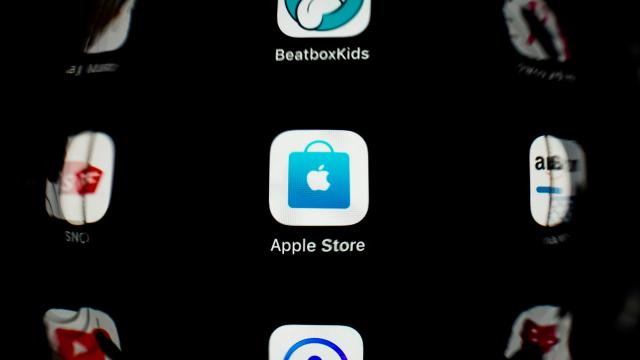Major news organisations are joining Epic Games in the push for Apple to rethink its app store terms following Fortnite’s high-profile ban this month.
[related_content first=”1286316″]
Digital Content Next, a trade organisation representing the New York Times, the Washington Post, the Wall Street Journal, and dozens of other media outlets and publishers (including yours truly, G/O Media), sent a letter to Apple CEO Tim Cook on Thursday asking if it was possible to renegotiate a better deal with the tech giant regarding its notoriously high commission rates for app developers. AKA what’s infamously known as “the Apple tax.”
As it stands, news outlets fork over 30 per cent of all revenue from first-time subscriptions made through iOS apps, with Apple’s cut falling to 15 per cent after the first year should the reader continue their subscription, per the Wall Street Journal. A 30 per cent tax on an app’s revenue is standard across the board on both Google and Apple’s app stores, though the latter gets significantly more heat for this because of its walled garden (whereas Android’s open ecosystem allows for multiple stores if app developers would rather not pay the toll).
“The terms of Apple’s unique marketplace greatly impact the ability to continue to invest in high-quality, trusted news and entertainment particularly in competition with other larger firms,” said the letter, which is signed by Digital Content Next’s CEO, Jason Kint.
In the letter, Kint argues that Apple has previously made an exception to its usual 30 per cent rate for one preeminent customer in particular: Amazon. Emails between top Apple exec Eddy Cue and Amazon CEO Jeff Bezos that were revealed in an antitrust hearing last month showed that Amazon agreed to pay Apple just 15 per cent of its revenue from Amazon Prime Video subscriptions during its first year on the app store. Given this, Kint contends that Digital Content Next’s news outlets and publishers should qualify for the same kind of modified terms Amazon was offered. At the very least, Apple needs to outline what conditions Amazon met to receive such a discount and afford other app developers the same opportunity.
“The monopolistic behaviour of big tech puts a wide range of industries — not the least of which is the news industry — at a distinct disadvantage,” the group’s SVP of government affairs, Chris Pedigo, wrote in a blog post Thursday. “It is laudable that EU and American regulatory bodies are digging in and uncovering these anti-competitive behaviours. Talking trust is not enough. We need to level the playing field and transparency is a critical first step.”
Earlier this month, Epic Games filed lawsuits against both Apple and Google for removing its Fornite game from their respective app stores. In what was clearly an orchestrated antitrust trap, Epic added a way for players to make in-game purchases directly from its store in a recent update to both its iOS and Android apps. Since this circumvents Apple and Google’s payment systems and, by extension, blocks them out of their cut of the sales, both companies banned Fortnite for violating store policies.
That started a domino effect that just seems to keep right on going. Epic responded with a ridiculously theatrical video raking Apple over the coals and pushed out a “Free Fortnite” hashtag to rally its player base against the tech giant. In turn, Apple hit back by promising to ban all of Epic’s developer accounts and cut the company off from its iOS and Mac development tools by the end of the month.
Spotify and Tinder-owned Match Group later levied their own antitrust complaints against Apple. Then Facebook, ecstatic to not be the most-hated tech company for once, joined the fray and accused Apple of stifling small businesses with its steep commission prices.
It’s starting to feel like an episode of Oprah at this point. But instead of giving out cars, it’s “You challenge the Apple tax! You challenge the Apple tax! Everyone here challenges the Apple tax!”
